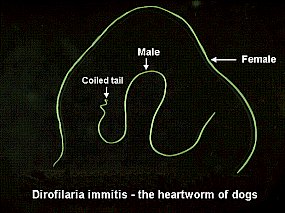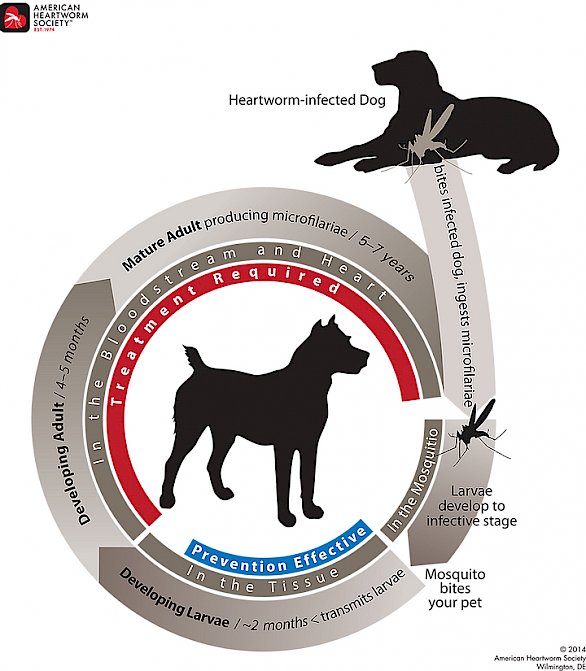Maddie's Story

Maddie's heartworm diagnosis led to a discovery that possibly saved the lives of other dogs and definitely brought awareness to the importance of heartworm prevention.
Maddie was an English Lab born in 2000 and adopted by the best fur-parents a dog could have (the Roberts). Her fur-mommy, Kelly, started using me as a vet when I opened my first brick-and-mortar clinic in Metairie (West Metairie Plaza Veterinary Clinic).
Maddie was given heartworm prevention religiously! I mean, Kelly would come into the clinic to purchase more heartworm prevention before she even ran out!! She is one of those women you get jealous of because she is always put together, even in her workout clothes. Always bubbly, talkative and never said a bad word about anyone. A dedicated pet owner, she was habitually on time for every biannual and yearly visit.
 In 2011 while running a routine heartworm test at Maddie's annual visit she came up positive. What does this mean? An Occult Heart Test is what veterinarians run "in-house" (meaning in the clinic) to quickly assess if a patient has any adult female heartworms in the heart. That is, it does not test for any adult males nor does it test for any babies. The test is called an antigen test that tests for a hormone that the female adult, mature, sexually active heartworm produces from her uterus.
In 2011 while running a routine heartworm test at Maddie's annual visit she came up positive. What does this mean? An Occult Heart Test is what veterinarians run "in-house" (meaning in the clinic) to quickly assess if a patient has any adult female heartworms in the heart. That is, it does not test for any adult males nor does it test for any babies. The test is called an antigen test that tests for a hormone that the female adult, mature, sexually active heartworm produces from her uterus.
So, as you can tell it's extremely important these tests are to run yearly. Unfortunately, I am still blown away to hear stories of how people get so mad about being required to run one every year. And YES, we do refuse the sale of heartworm prevention to any client who declines this test because giving certain preventions to a heartworm positive dog can cause severe illness. Also, if you have a resistant heartworm then your dog is contaminating the mosquitoes in your area - risking the health of other dogs in that area and beyond. I actually had a client leave us for this exact reason. They tried to bully me and my staff, said we did not care if their pet got sick, and that we just wanted them to buy the medication…can you believe that! We cared so much about his pet that we had to decline, stuck to our ethics and morals, and did what was best for that pet.
Back to Maddie…needless to say, mom was devastated to hear that her dog had heartworm. "How can this be?" she asked, "I gave her the prevention every month". As veterinarians we always think, maybe she missed a dose, maybe the dog vomited up the pill immediately outside when the owner wasn't watching. Maddie also had a lot of Microfilaria which are babies produced by mating heartworms in the heart.

"How Did You Know What To Do?"
This is a question I've been getting from a number of veterinarians. Well, I attended some local continuing education classes and just happened to attend a lecture from Dr. Byron Blagburn at Auburn University's College of Veterinary Medicine about this exact topic. Dr. Blagburn, a parasitologist, was doing heartworm resistance research at the time (the FDA had a suspicion in 2005 that there was resistance, but no studies had been done yet).
 Since I was well educated on heartworms at this point I started Maddie on a tetracycline-class antibiotic to kill bacteria that live on the adult heartworm called Wolbachia (right), which helps the worm survive and be robust.
Since I was well educated on heartworms at this point I started Maddie on a tetracycline-class antibiotic to kill bacteria that live on the adult heartworm called Wolbachia (right), which helps the worm survive and be robust.
The antibiotic is given 1 month prior to starting adulticide (killing the adult heartworms) so that there are fewer side effects that cause additional illness from the treatment. I tell my clients that it helps shrink the worm and make it ill so when we administer the Immiticide® shots (a.k.a. adulticide treatment) the worms we kill will be puny and sick - instead of strong and healthy - and will die off in pieces making it easier for the dog to handle.
We called to speak with Dr. Blagburn, but because we were ahead of the game and had begun the course for her adulticide treatment, Auburn could not use Maddie's blood for their research. We also changed the type of heartworm prevention since, at the time, we did not know if this was a failure of the product. This is understandable because who would want to keep their pet on a prevention that did not work, right?
I debated on sharing the name of the product because we soon learned that the problem was not due to that product failing, but rather one of true resistance. So, since the actual brand ended up not being relevant to the issue, and we all know how information gets twisted, stories misconstrued, false information shows up…you get my drift. That being said, at the end of the blog I'll provide you with some recommendations.
Maddie went through her first heartworm treatment, we dosed her up with lots of supplements, vitamins, and watched her closely. We followed the AHS (American Heartworm Society) protocols. And three years later, BAM! She has heartworms again!!
Ok now, once may be a product failure or client compliance, but if you ever had a heartworm-positive dog and go through the expense of treatment, trust me, you will never forget a dose and you will watch that your dog actually eats and swallows the medication! At this point, we were certain there was some sort of resistance going on (meaning the heartworm Maddie had would not be stopped with prevention) Quick education on prevention: When you give heartworm prevention you are really not "preventing" anything. You are actually killing migrating larva that are traveling in the tissues trying to find their way to the bloodstream and heart to become sexually mature adult heartworms that produce microfilaria.
This time I called the manufacturing company of the prevention that Maddie was on and asked who could I send this blood to be tested for resistance...
Can My Dog Be Tested For Resistant Heartworm?
There is NO TEST for resistant heartworm to date. You just need to have a suspicion of a client with good purchase history, a positive occult heartworm test, and a positive microfilaria test. The positive results of microfilaria means that the adults are healthy and producing babies. Most common heartworm preventions kill the first larval stages and microfilaria, so if a patient is on heartworm prevention AND has microfilaria….well, then there is a good chance your pet has a resistant strain.
That Was My Thought...
The next step was to give Maddie, a heartworm positive dog, a heartworm prevention pill while at the clinic (per the AHS guidelines) under the DIRECT supervision of a veterinarian. This was to monitor Maddie for any reactions to the medication and to make sure she completely swallowed the pill. We retested Maddie's blood for microfilaria again, about 2-4 weeks later. Once again, she tested positive and microfilaria showed up in the results, further indicating a resistant strain.
This time we got in touch with Dr. Ray Kaplan at the University of Georgia College of Veterinary Medicine and sent him A LOT of blood vials so they could start the testing procedures in their lab. This is no easy feat. We had to draw numerous vials of blood, ship it a certain way to ensure the microfilaria were kept alive during transit, AND the hardest part was that Maddie's mom had to agree to hold off on any treatment until the lab was able to make sure the microfilaria was viable. Imagine knowing your fur-baby has heartworms, you have to hold off treatment, and every day you know those horrible parasites are replicating and causing damage to your baby's heart. But Kelly knew how important this was for the future, and wanted to help researchers figure out why the resistance was occurring. She unselfishly postponed treatment for a month or so.
Unfortunately, we received word from the lab that the first batch died! I cannot remember exactly why, but there was a temperature issue at the lab. So, we sent batch #2. Viable! From there we knew to start Maddie on Minocycline.
Maddie lived for another two years before passing away at the ripe old age of 16. She was frail and having had heartworms twice did not help, but she had such good care and genetics that she lived a long and happy life. Thanks to Maddie and her mom's strength and bravery, researchers are continuing work on learning how to deter this strain and prevent infection of other dogs in the future.
My Humble Recommendations
Mosquito Repellent
If you are concerned and you live in an area with a lot of mosquitoes, I strongly recommend using a safe proven mosquito repellent. I currently am using Vectra3D because they have studies proving their efficacy, and if you know me or are a client of mine you know that I like proven products with studies backing their claims. This allows me to pick the safest and most effective products for my patients. Yes, there are other repellents on the market such as K9 Advantix II and BioSpot, but in my opinion, are not as good as the Vectr3D. Also, Vectra3D does not travel systemic, rather it stays just on top of the dermal layer. And no, I am not getting any kick-backs or "sleeping with Ceva". I have already gotten the phone calls insinuating this…as a veterinarian, I genuinely like this product. It is safe, I use it on our family dogs, so I recommend it. That is it.
Heartworm Prevention
I like Heartgard Plus, Interceptor Plus, Trifexis. I think they are easy to administer and get intestinal parasites as well, which is also important. But, if you are a client that forgets occasionally, then ProHeart injections may be your best bet. This is an injection given every 6 months by your veterinarian, which also means you will never forget.
In short, ProHeart 6-month injection and Vectra3d are the easiest, but an oral medication such as Interceptor Plus and Vectra3d topical are just as good. Again, I am not getting any kick-backs for these recommendations. But if the drug companies want to help support local rescue groups that come to my clinic then I'm cool with that.
Media Spotlights for Maddie
- Metairie dog infected by new drug-resistant strain of heartworms - WDSU (NBC affiliate, New Orleans)
- Rare drug-resistant heartworm found in Metairie dog could help improve testing - NOLA.com
- Metairie dog contracts rare, drug-resistant strain of heartworms - WVUE (FOX affiliate, New Orleans)
- Drug-resistant heartworm strain found in Louisiana Labrador - Veterinary Practice News
- Drug-resistant strain of heartworms found in Metairie dog - WGNO (ABC affiliate, New Orleans)

